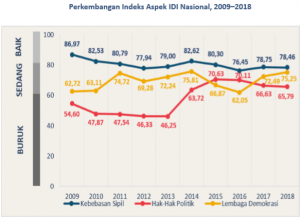Indonesia Democracy Index Remains in Moderate Category
 Indonesian Democracy Index (IDI) in 2018 is at 72.39, increasing 0.28 points compared to that in last year at 72.11, the Central Statistics Agency (BPS) has reported.
Indonesian Democracy Index (IDI) in 2018 is at 72.39, increasing 0.28 points compared to that in last year at 72.11, the Central Statistics Agency (BPS) has reported.
“With this figure, level of democracy in Indonesia remains in the “moderate” category,” said Head of the BPS Dr. Suhariyanto, Monday (29/7).
According to him, the increasing of democracy index is affected by a decrease in the aspect of Civil Liberties by 0.29 points (from 78.75 to 78.46), a decrease in the aspect of Political Rights by 0.84 points (from 66, 63 to 65.79), and an increase in the aspect of the Democratic Institution by 2.76 points (from 72.49 to 75.25).
The Indonesian Democracy Index (IDI) is a composite indicator that shows level of development of democracy in Indonesia. The level of achievement is measured based on the implementation and development of 3 aspects, 11 variables, and 28 indicators of democracy.
The IDI calculation methodology uses 4 data sources, namely: (1) review of local newspapers, (2) review of documents (Regional Regulations, Gubernatorial Regulations, etc.), (3) Focus Group Discussion (FGD), and (4) in-depth interviews.
Based on the IDI data from 2009 to 2018, level of democracy in Indonesia experienced fluctuations, such as in the period of 2009-2013 when the index fluctuated in the range of 60s, while in the 2014-2018 period the index were in the range of 70s.
Level of democracy is categorized into three types, namely “good” (index> 80), “moderate” (index 60–80), and “bad” (index <60), showing that although the IDI level is still in the “moderate” category, it has experienced a significant increase compared to five years ago.
Suhariyanto further said that there are six variables that experienced an increase and four variables experienced a decreased.
The three variables with the largest increase occurred in variable of Role of Political Parties which increased by 10.46 points, followed by the variable of Independent Judicial Role which increased by 4.41 points, and variable of Freedom of Association and Association which increased by 3.19 points.
“While the two variables that experienced the largest decline were the variable of Political Participation in Decision Making and Supervision which decreased by 1.88 points, and the variable of Freedom of Belief which decreased by 1.42 points,” Suhariyanto explained.
Regarding the IDI at the provincial level, Suhariyanto said that in the 2017-2018 period, the number of provinces with “good” category increased from 4 provinces to 5 provinces.
“However, there is one province that falls into the “bad” category, namely West Papua province. Meanwhile, 28 other provinces are in the “moderate” category,” Suhariyanto said.
DKI Jakarta province, he continued, managed to maintain its position in the first rank with an IDI value of 85.08, followed by Bali province with an IDI value of 82.37.
The third and fourth positions are East Nusa Tenggara provinces and North Kalimantan provinces with IDI values of 82.32 and 81.07 respectively. The fifth position is DI Yogyakarta province with an IDI value of 80.82, dropped three positions from last year.
In the meantime, compared to the IDI in 2017, according to Suhariyanto, 20 provinces experienced an increase and 14 provinces experienced a decline in IDI value in 2018.
“The two provinces with the largest increase are Aceh province and East Nusa Tenggara province, with an increase of 9.04 points and 6.82 points. Meanwhile, the two provinces that experienced the largest decline are Bangka Belitung Islands province and Jambi province which decreased by 6.68 points and 5.41 points respectively, ” Suhariyanto said. (Public Relations of BPS / ES)
Translated by: Estu Widyamurti
Edited by: M. Ersan Pamungkas








